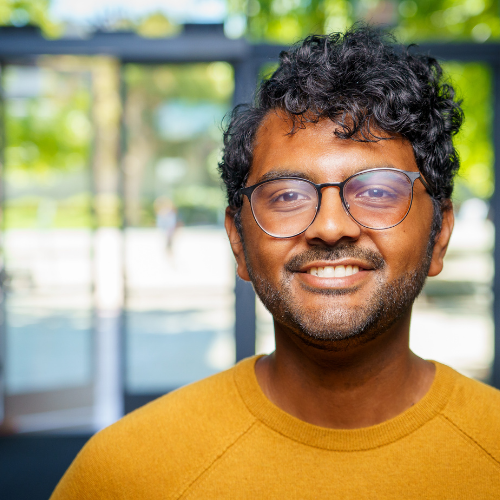
The line between artistic expression and scientific exploration might not be a line at all – but rather a supercharged loop of continuous creativity. That’s certainly true for Deepak Kumar, a computer scientist who joined the University of California San Diego this year.
“I’m a playwright, composer, lyricist, and researcher,” said Kumar in an online self-reflection. “I write about the questions that keep me up at night, whether they be about Asianness, technology, youth, board games, or soul-eating demons.”
Kumar is an assistant professor in the Jacobs School of Engineering’s Department of Computer Science and Engineering (CSE) and an accomplished, award-winning playwright with five full-length shows. While his culturally immersive plays, “House of India” and “Baked! The Musical,” wrestle with all-too-real internal conflicts, the visionary’s scientific research takes aim at a real-world global threat – digital security.
Specifically, Kumar’s research focuses on sociotechnical cybersecurity (STC). This subarea looks at the complex interactions between humans, technology, and society and considers social, psychological, economic, technical, legal, and policy factors when devising solutions to cybersecurity threats. These threats range from harassment and abuse to misinformation and disinformation, among others.
“Technology has done incredible things for the world, but it has also exacerbated many societal harms. My work seeks to both understand how technology enables these harms in practice and how to build technology that is resilient to these types of threats,” said Kumar.
In the course of his work, Kumar blends large-scale, data-driven measurements with human-centered studies to understand how threats are spread online and how people experience them. His research has direct applications for Internet of Things devices, social media sites, and even the daily news.
For example, Kumar and several colleagues from Stanford have developed an interface that provides journalists, especially those of marginalized identities, greater agency when engaging with readers on social media platforms. Their tool, aptly named PressProtect, is designed to shield the press from online harassment by leveraging a logical abstraction for reader comments and user interface controls.
“My work contributes insights, data, defenses, and systems that seek to make the Internet a safer place for all people,” said Kumar.
Ultimately, Kumar hopes his research will mitigate toxic content, phishing, and other digital safety threats. He joined CSE to collaborate with researchers who share these goals and to work alongside the department’s world-class faculty.
“I’ve long admired the work of many faculty here – and it was one of the coolest moments of my life to have those people eager to learn about and engage with my own research,” said Kumar.
During his interview, Kumar was intrigued by the work/life balance he perceived at CSE. He felt the faculty took their work seriously, but didn't take themselves too seriously. He was also excited to find perfect tennis weather year-round.
Since relocating to San Diego, Kumar has enjoyed shows at The La Jolla Playhouse on campus and The Old Globe in Balboa Park. His own play, “Baked!” had a concert reading in New York City in early October – a one-night-only performance produced by National Asian Artists Project and Prospect Theatre Company. "House of India" will receive a production in town next year as part of The Old Globe's 2025 season.
Deepak Kumar was recognized in 2024 with one of Google’s inaugural Google Academic Research Awards (GARA) for his proposal, Automated Conversational Interventions to Curb Toxic Content in Online Communities, in the Trust & Safety category.
Prior to joining CSE, Kumar was a postdoc researcher at Stanford University and earned his PhD in Computer Science from the University of Illinois Urbana-Champaign. He was awarded the MacDowell Colony Fellow in 2022 for his creative work.
By Kimberley Clementi

